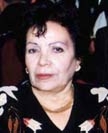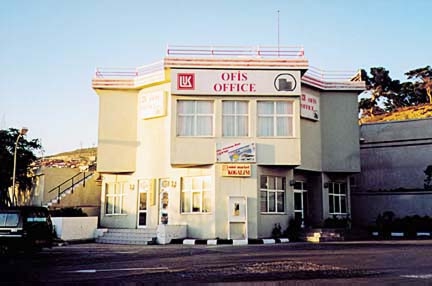|

Spring
2000 (8.1)
Afshan Mammadova
Computer
Sciences
  I was so pleased when
we were finally able to claim that we had our very own alphabet.
It used to bother me that the other republics in the Caucasus
- Georgia and Armenia - both had their own alphabets, but that
we had to use Cyrillic. I was so pleased when
we were finally able to claim that we had our very own alphabet.
It used to bother me that the other republics in the Caucasus
- Georgia and Armenia - both had their own alphabets, but that
we had to use Cyrillic.
But the process of transition has been long and difficult. It's
like changing our national treasure completely. What does "national
treasure" mean, you may ask? Well, it's the repository of
our books and manuscripts, which distinctly reflects our own
culture.
Some major steps should be taken before any nation attempts to
change its alphabet. No country should undertake to change its
alphabet like we did. We neither prepared our elderly nor our
youth. Such fundamental changes require well-thought out, careful
preparations.
When I first started learning the Latin alphabet, it was difficult
for me to get used to some of the letters. I used to put the
two alphabets - Azeri Latin and Azeri Cyrillic - in a chart side
by side on my desk so I could refer to them often.
Why is the Apostrophe
Gone?
It seems to me that it was a mistake to have eliminated the apostrophe
in the Latin version. We've always used an apostrophe - both
in Arabic and Cyrillic - to indicate certain sounds [glottal
stops in some words of Arabic origin]. I don't understand why
they took the apostrophe away. Some words require it if you're
going to pronounce them correctly.

Photo: The petrol station
of Russian-owned LUKOIL had its signage in Azeri Latin and English.
Unfortunately, the station was totally demolished by a landslide
this spring.
Of course, I'm
glad that Latin is being adopted now for nearly all of the Turkic-speaking
nations [such as Uzbekistan, Turkmenistan, Tatarstan, Turkey]
With few exceptions, all the letters in our Azeri Latin alphabet
are identical to Turkish - so it's a good sign of unity.
Few Books in Azeri
When I was growing up, I enrolled in the Azeri track at the Institute.
My daughter followed my example but my son enrolled in the Russian
track. He's the only one who has never had any problem gaining
access to books. There were thousands of books in the Russian
language in Azerbaijan during the Soviet times, while considerably
fewer were available in Azeri Cyrillic.
Now here we are again 30-40 years later and the situation is
repeating itself. There are so few books that have been published
in Azeri Latin. What will happen to the level of education in
the coming generations? These alphabet changes will lead to an
information blockade if we don't do something about it.
The few Latin textbooks that are available are of very poor quality.
They're designed poorly and have a lot of mistakes and misspelled
words. This discourages kids from reading. I recently bought
some schoolbooks for my grandchildren when I was in Moscow. They
were so beautiful, so full of illustrations and had such interesting
texts. Why can't we have such books in Azeri Latin?
There are still hardly any books available in Azeri Latin for
institutions on the university level. Future generations will
be affected even more because they will know only the Latin script
and will be cut off from Cyrillic. Today's Institute students
have learned both Cyrillic and Latin, so it's not hard for them
to read both scripts.
Take my field of computer sciences. Only one computer science
textbook has been published in Azeri Latin. When I was in Moscow
recently, I found hundreds of books on the subject. But there
are hardly any computer books printed in the Azeri language,
much less in the new Latin script.
I've written two books. One of them - "Computer Science
Graphics" - was published recently in Azeri Cyrillic. I'm
writing a second text, "The Novelty of Windows in Computer
Science," which will be published in Azeri Latin.
Another problem is lack of standardization of an Azeri Latin
font set to use on computers and the Internet. I'm really sorry
that the font problem has not yet been solved. Why can't I find
any Web sites in Azeri Latin? Instead, I have to find materials
about computers on the Internet in English, then translate them
for my students. This is just another one of the headaches of
the new alphabet.
Of course, evidence of our new alphabet surrounds us these days
- notices, billboards, advertisements and store names. I sense
a trend among Azerbaijanis to speak in their mother tongue more
and more, even among those who used to speak only Russian. And
among Russian-track students at the university, especially in
informal settings, there's a greater tendency to hear Azeri rather
than Russian these days. So times are changing.
Afshan Mammadova (born 1937) is an Assistant Professor
of Computer Sciences at the Azerbaijan Institute of Cooperation.
She grew up speaking Azeri and Armenian, as she was born in Yerevan,
Armenia. The one school that offered instruction in Azeri was
too far from her home, so she attended Armenian schools. In 1956,
she entered the Faculty of Physics and Mathematics at Yerevan
Pedagogical Institute, which was the only Azeri Faculty among
all the Armenian Institutes. Though Afshan claims that her ability
in both Azeri and Armenian is stronger than her Russian, she
did have to defend her doctoral thesis in Russian, as is customary
for all doctoral students. At home, she speaks Azeri.
From Azerbaijan International (8.1) Spring 2000.
© Azerbaijan International 2000. All rights reserved.
Back to On the Street: Alphabet
Viewpoints Index
Home
| About Azeri | Learn
Azeri | Contact us
|


